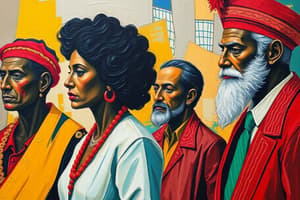Podcast
Questions and Answers
What is the title of the book edited by E.C. Eze in 1997?
What is the title of the book edited by E.C. Eze in 1997?
Who wrote the book 'Eight Eurocentric Historians' in 2000?
Who wrote the book 'Eight Eurocentric Historians' in 2000?
What is the title of the journal in which A. Mazama published an article in 2001?
What is the title of the journal in which A. Mazama published an article in 2001?
Where is Sankore University Press located?
Where is Sankore University Press located?
What is the title of the book written by M. Karenga in 1993?
What is the title of the book written by M. Karenga in 1993?
Who is the author of the article 'Multicultural Education'?
Who is the author of the article 'Multicultural Education'?
What is the title of the handbook edited by A. Mazama in 2003?
What is the title of the handbook edited by A. Mazama in 2003?
Where is Africa World Press located?
Where is Africa World Press located?
Who wrote the book 'Social Evolutionism'?
Who wrote the book 'Social Evolutionism'?
What is the title of the book written by H. Trevor-Roper in 1965?
What is the title of the book written by H. Trevor-Roper in 1965?
What is a consequence of prioritizing experiential/emotional approaches in Africana Studies?
What is a consequence of prioritizing experiential/emotional approaches in Africana Studies?
What is the term used to describe the intellectual state of Africana Studies when it relies on White/Eurocentric theories?
What is the term used to describe the intellectual state of Africana Studies when it relies on White/Eurocentric theories?
What does W.E.B. Du Bois argue in 'The Souls of Black Folk'?
What does W.E.B. Du Bois argue in 'The Souls of Black Folk'?
What is the result of Africana Studies relying on experiential/emotional approaches without theoretical frameworks?
What is the result of Africana Studies relying on experiential/emotional approaches without theoretical frameworks?
What is the term used to describe the state of Africana Studies when it is marginalized and dependent on White/Eurocentric theories?
What is the term used to describe the state of Africana Studies when it is marginalized and dependent on White/Eurocentric theories?
What is the primary concern with relying on experiential/emotional approaches in Africana Studies?
What is the primary concern with relying on experiential/emotional approaches in Africana Studies?
What is the implication of Africana Studies being solely focused on experiential/emotional approaches?
What is the implication of Africana Studies being solely focused on experiential/emotional approaches?
What is the goal of decolonizing knowledge in Africana Studies?
What is the goal of decolonizing knowledge in Africana Studies?
What is the relationship between Africana Studies and other disciplines when it relies on experiential/emotional approaches?
What is the relationship between Africana Studies and other disciplines when it relies on experiential/emotional approaches?
What is the consequence of Africana Studies being relegated to an 'academic ghetto'?
What is the consequence of Africana Studies being relegated to an 'academic ghetto'?
What has been the primary objective of Eurocentric writers in their depiction of Africa?
What has been the primary objective of Eurocentric writers in their depiction of Africa?
What was the outcome of Napoleon and Dominique Vivan Denon's conquest of Egypt?
What was the outcome of Napoleon and Dominique Vivan Denon's conquest of Egypt?
What is the significance of the Nile River in the context of African history?
What is the significance of the Nile River in the context of African history?
What has been the impact of Eurocentric education on African history and culture?
What has been the impact of Eurocentric education on African history and culture?
What is the primary goal of decolonizing knowledge in Africana Studies?
What is the primary goal of decolonizing knowledge in Africana Studies?
How has Europe treated African contributions to ancient Egyptian civilization?
How has Europe treated African contributions to ancient Egyptian civilization?
What is the significance of Champollion's deciphering of the language of the ancient Egyptians?
What is the significance of Champollion's deciphering of the language of the ancient Egyptians?
What has been the outcome of the Eurocentric approach to African history and culture?
What has been the outcome of the Eurocentric approach to African history and culture?
What is the significance of Egypt in the context of African history and culture?
What is the significance of Egypt in the context of African history and culture?
What is the primary objective of reclaiming African agency in history?
What is the primary objective of reclaiming African agency in history?
Who wrote the book 'The Crisis of the Negro Intellectual' in 1967?
Who wrote the book 'The Crisis of the Negro Intellectual' in 1967?
What is the title of the book edited by Kimberlé Crenshaw and others in 1995?
What is the title of the book edited by Kimberlé Crenshaw and others in 1995?
Who wrote the book 'A Voice from the South' in 1892?
Who wrote the book 'A Voice from the South' in 1892?
What is the title of the book written by David R. Egerton in 1999?
What is the title of the book written by David R. Egerton in 1999?
Who wrote the book 'The Black Jacobins' in 1963?
Who wrote the book 'The Black Jacobins' in 1963?
What is the title of the book written by Lani Guinier in 1994?
What is the title of the book written by Lani Guinier in 1994?
Who wrote the book 'The Irritated Genie' in 1985?
Who wrote the book 'The Irritated Genie' in 1985?
What is the title of the book written by Vincent Harding in 1987?
What is the title of the book written by Vincent Harding in 1987?
Who wrote the book 'Slavery Attacked' in 1990?
Who wrote the book 'Slavery Attacked' in 1990?
What is the title of the book written by F. Douglass in 1950?
What is the title of the book written by F. Douglass in 1950?
Flashcards are hidden until you start studying
Study Notes
Eurocentric Assumptions
- Europeans are superior, Africans are inferior: 30 common reasons were listed by Blaut (2000) to justify European superiority, including a better climate, better soils, and unique inventiveness and rationality.
- This assumption led to "Eurocentric diffusionism", where progress is seen as permanent and natural in Europe, but not elsewhere, and that progress in other regions is mainly due to the diffusion of innovative ideas and products from Europe.
- In this schema, non-Europeans are destined to be consumers of European culture, whether in the form of concepts or goods.
Classification of Human Beings
- During the Enlightenment period, humans were classified into four or more categories based on their level of civilization, with Europeans being seen as civilized and others as less or uncivilized.
- Examples of such classification include Herbert Spencer's social Darwinist theory, which categorized human societies into four levels of differentiation, and Edward Tylor's three great stages of human evolution: savagery, barbarism, and civilization.
- Cultural differences were seen as marks of inferiority in this Eurocentric context.
Linear Evolutionism
- This assumption posits that all human beings evolve along the same line, with Marxism being a notable example, featuring four different stages that every society is supposed to experience.
- This linear evolutionism is understandable within the context of universal evolutionism, where every society is seen as evolving along the same path.
Africana Studies and Discursive Formations
- For nearly a century, intellectuals and activists of African origin and descent have used the term "Africana" to include the life worlds and lived experiences of continental and diasporan Africans.
- Discursive formations, or knowledge production and dissemination, provide the theoretical thrusts that guide and establish interdisciplinary arenas while exploding traditional disciplinary boundaries.
The Critical Turn towards Africana Thought
- There has been a critical turn towards Africana thought or philosophy due to the overemphasis on experience and emotion in the study of continental and diasporan African life.
- After 500 years of Europeanization of human consciousness, Africana theorists argue that Africana history and culture need Afrocentric analysis.
Internalized Anti-African Thought and Practices
- Africana peoples have been systematically socialized and ideologically educated to view and value the world using a European imperial modus operandi.
- Many Africana people have internalized anti-African thought and practices, creating problems for and plaguing Africana Studies.
Africana Philosophy and Critical Theory
- Leopold Sedar Sénghor's advances and retreats in the development of Africana philosophy and critical theory are discussed in the context of Negritude, Cultural Mulattoism, Africanity, and African Socialism.
- Black existentialism or Africana philosophy of existence provides the theoretical tools to tease out the issues involved in the experiential/emotional approach in Africana Studies.
Africana Philosophy of Existence
- Africana philosophy of existence or Black existentialism confronts existential and ontological questions and claims that differ for each human group due to their unique historical horizon and cultural contexts.
- For further discussion of Africana philosophy of existence, see Lewis Gordon's work, particularly Existence in Black: An Anthology of Black Existential Philosophy (1997a) and Existentia Africana: Understanding Africana Existential Thought (2000).
Africanity and Identity
- The conception of "Africanity" involves a combination of African identity and African personality theory, drawn primarily from the work of Tsenay Serequeberhan (1998).
- Africanity has more to offer human and social science than merely its experiential/emotional aspects.
The Limitations of the Experiential/Emotional Approach
- Privileging the experiential/emotional approach can lead to a multiplicity of narratives and biographies of Blacks' experience of the world, but with no theoretical tools to critically interpret these experiences.
- This approach can result in a dependency on White/Eurocentric disciplines to interpret Black life worlds and lived experiences, reproducing intellectual dependency and colonial complexes.
Afrocentricity and Conscientization
- Conscientization is a central concept in Afrocentricity, making it distinct from Africanity.
- Afrocentricity involves conscientization related to the agency of African people, making them self-conscious human beings.
- Conscientization is key to reorientation and recentering, enabling individuals to act as agents rather than victims or dependents.
The Agency Concept
- An agent is a human being capable of acting independently in their own best interest.
- Agency refers to the ability to provide psychological and cultural resources necessary for human freedom.
- In situations of oppression, the concept of agency assumes primary importance.
Afrocentricity and Agency
- Afrocentricity involves recognizing African people as agents in economic, cultural, political, and social terms.
- The degree to which Africans are weak or strong agents is open to intellectual discourse, but agency itself is a fundamental aspect.
- The absence of agency leads to marginality, with the worst form being marginalization within one's own story.
The Problem of Marginalization
- Marginalization is not just limited to being ignored, but also involves the obliteration of the presence, meaning, activities, or images of African people.
- This is a result of White racial domination, leading to a negated reality and destruction of African spiritual and material personality.
Minimum Characteristics of Afrocentricity
- An Afrocentric project should include:
- Interest in psychological location
- Commitment to finding the African subject place
- Defense of African cultural elements
- Commitment to lexical refinement
- Commitment to correct the history of Africa
The Need for a New Narrative History of Africa
- Eurocentric writers have traditionally positioned Africa as inferior, leading to a deliberate falsification of historical records.
- The Afrocentrist's primary obligation is to assess the condition of research and intervene appropriately to correct this narrative.
- This is particularly evident in the study of Kemet, classical Egyptian history, where African contributions have been misrepresented as European.
The Third Modal Period: Reaffirmation of Africanness
- The 1960s marked a period of reaffirmation of African Americans' connection to their African heritage and cultural values.
- This period was characterized by a cultural revolution, where African Americans turned towards Africa for roots and revitalization, rejecting European views and values.
- The Organization Us, a major Black Power and cultural nationalist organization, called for a "thrust towards full re-Africanization," borrowing from Sékou Touré's phrase.
Reaffirmation of Social Justice Tradition
- African Americans reaffirmed their social justice tradition, which emphasized respect for human rights, economic justice, meaningful political participation, shared power, cultural integrity, and mutual respect for all peoples.
- The Million Man March Mission Statement outlined the minimum requirements for this tradition, including respect for human rights, economic justice, and uncompromising resistance to social forces that deny or limit these rights.
Key Figures and Publications
- Sékou Touré, a continental African leader, influenced the concept of re-Africanization.
- Maulana Karenga, a prominent scholar, wrote about the reaffirmation of Africanness in the 1960s.
- Various publications, including "The Afrocentric Paradigm" and "Red, Black, and Green: Black Nationalism in the United States," contributed to the intellectual and cultural movement of the 1960s.
Studying That Suits You
Use AI to generate personalized quizzes and flashcards to suit your learning preferences.




